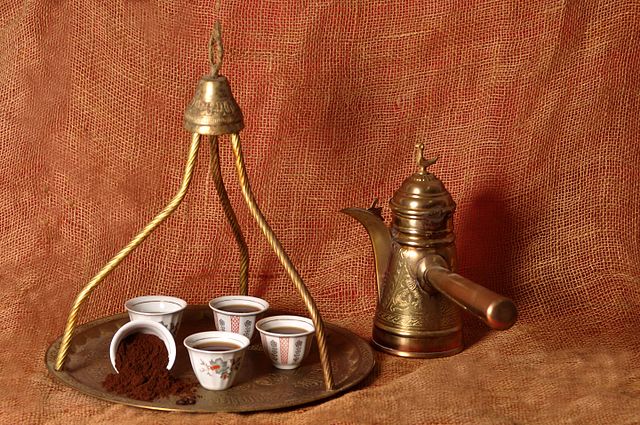The Significance of Arab Coffee: A Tradition that Brews Hospitality and Heritage

Arab Coffee. Photo: Wikimedia
By: Joud Sleilaty / Arab America Contributing Writer
In the Arab world, serving Arab coffee is a time-honored tradition that goes beyond mere beverage consumption. This custom is steeped in history and deep-rooted cultural values, and it originated in Yemen. Arab coffee has become a symbol of welcome, a source of communication, and a bridge to tradition, even for those who have immigrated far from their homeland. Hosting guests is not just a social obligation in Arab culture; it is a cherished act of hospitality. When visitors enter an Arab home, they are greeted with warmth, respect, and a tiny, but powerful, cup of coffee. The offering of coffee signifies an open heart and home. This custom reflects the profound importance of community and human connection in Arab culture.
Preparation of Coffee
Arab coffee, also known as “qahwa” or “gahwa,” is a unique brew that differs greatly from the typical coffee experience in the Western world. Unlike the creamy, sugary concoctions that dominate café menus in the West, Arab coffee is characterized by its bitter, earthy flavor, often seasoned with spices like cardamom. The preparation of this brew is a deliberate, meticulous process that involves several steps. Here is a breakdown of the process:
- Roasting: Green coffee beans are roasted in a pan over a fire until they turn brown and release their aroma.
- Grinding: The roasted beans are then ground into a fine powder using a mortar and pestle.
- Brewing: The coffee grounds are placed into a large copper coffee pot, water is added, and the pot is placed on the fire. The coffee is brewed slowly, allowing the flavors to develop.
The serving of Arab coffee is equally ceremonial. The beverage is typically presented in small, handleless cups known as “finjan” or “dallah,” which are often adorned with intricate patterns. These cups may be small, but their significance is immense. They encourage conversation and prolong the experience of sipping coffee.
Coffee, Traditions, and Rituals
Arab coffee has not only remained a fixture in traditional hospitality but has also seamlessly integrated into various aspects of Arab life. It plays a pivotal role in significant cultural rituals, such as asking for someone’s hand in marriage. During these meetings, the prospective groom’s family visits the bride’s family, and the bride’s father serves coffee as a symbol of acceptance and goodwill. The act of serving coffee in this context carries a weighty message, signifying approval and the beginning of a union.
Interestingly, coffee has not just held the significance of new beginnings but also, on occasion, the one of the end. In Saudi Arabia, a woman once possessed the power to divorce her husband if he couldn’t provide her with coffee beans.
Moreover, coffee plays a role in the ancient art of “tasseography,” also known as coffee cup reading. After sipping their coffee, some people turn their empty cups upside down, allowing the coffee grounds to create patterns. A skilled reader can then interpret these patterns to provide insight into the future, a practice that has been passed down through generations.
Even as Arab communities have dispersed and emigrated to different parts of the world, the tradition of Arab coffee remains unbroken. One reason for this resilience is the simplicity of making Arab coffee; it requires minimal equipment and ingredients, making it easy to recreate the experience anywhere. Moreover, the act of serving coffee transcends borders, offering a piece of home to those who have left their homeland behind.
Yemeni Coffee Shops in the United States
In recent years, Yemeni coffee shops have been opening across the United States, offering a taste of authentic Arab coffee and a slice of Arab culture to the local community. One example is Qamaria, a chain of Yemeni coffee shops that has gained popularity for its commitment to preserving the tradition of Arab coffee. With six locations in Michigan, three in Texas, one in Ohio, one in Illinois, one in California, and one in Washington, D.C., Qamaria has become a hub for those seeking not just a cup of coffee but a connection to a rich cultural heritage.
These Yemeni coffee shops recreate the ambiance of an Arab majlis, or sitting room, where guests gather to converse and enjoy coffee. The setting is welcoming, fostering a sense of community and camaraderie. Customers are encouraged to linger, engage in conversation, and partake in the ritual of Arab coffee, much like they would in an Arab home.
Conclusion
In conclusion, Arab coffee, with its roots in Yemen, is far more than a mere beverage; it is a symbol of hospitality, tradition, and connection. The act of serving coffee to guests speaks volumes about the warmth and generosity of Arab culture. Despite the changing times and geographic distances, the tradition of Arab coffee has endured, offering a taste of home to those who have embraced it in far-flung corners of the world. The rise of Yemeni coffee shops like Qamaria in the United States exemplifies how this enduring tradition continues to thrive, bringing people together over small cups of coffee and a shared appreciation for culture and community.
Check out Arab America’s blog here!








